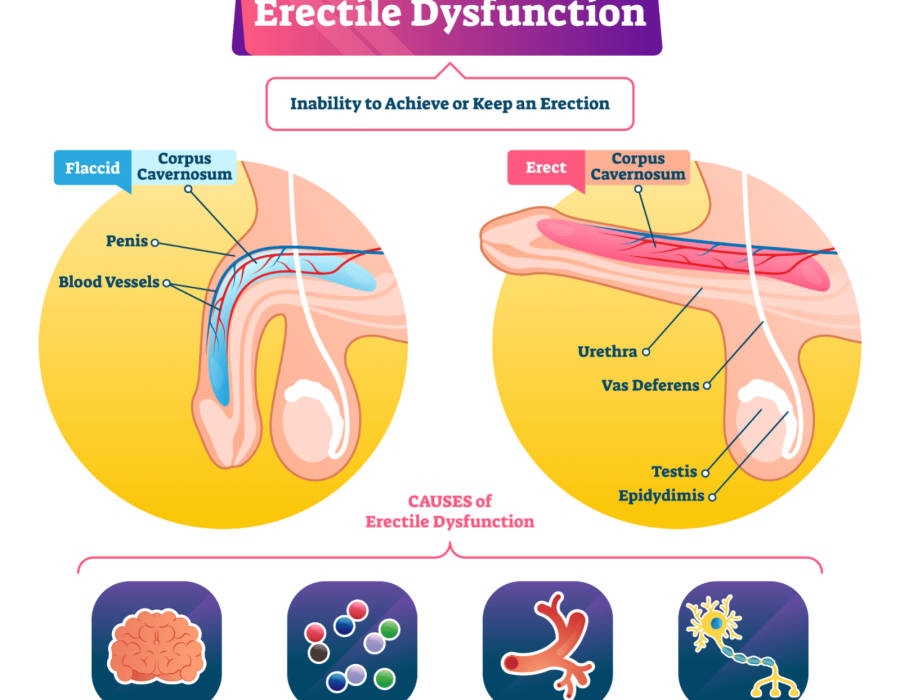Impotence, often known as erectile dysfunction (ED), is the inability of a man to achieve or sustain an erection that is strong enough for sexual activity. Stress, worry, or binge drinking can all contribute to it.
However, it may also be a sign of an underlying ailment like diabetes, high blood pressure, or atherosclerosis, which is the narrowing of the arteries.
Some drugs, such as beta-blockers and diuretics (which are frequently prescribed to treat a number of heart-related diseases like high blood pressure and heart failure), can lead to erectile dysfunction.
Why is erectile dysfunction as a warning sign for heart disease?
The arteries that provide blood to the penis widen during an erection, increasing the amount of blood that goes into the penis and causing it to enlarge.
Atherosclerosis, which affects arteries in the body, reduces blood flow, which can make it difficult to achieve or maintain an erection.
Your risk of a heart attack increases with atherosclerosis. Erectile dysfunction might be one of the first warning signals since the arteries in the penis are so small.
Any underlying medical issue, such as diabetes or angina, must be found. So make an appointment with your doctor if you're having ED issues.
In an effort to determine the source of the issue, he or she will assess and examine you, and may suggest testing. Never take an ED medication without first talking to your doctor.
What are the treatments for erectile dysfunction?
Sexual health medications can benefit two thirds of men wi th ED. Viagra (sildenafil), Cialis (tadalafil), and Levitra (vardenafil) are a few of these.
Before they operate correctly, you might need to take numerous doses over time, and you might need to change the dosage. According to national standards, if your condition is stable six months after a heart attack, you may be administered these medications.
A hormone called alprostadil, which is either as an injection or a pellet inserted within the male urethra (the tube that passes through the penis), is another therapeutic option for erectile dysfunction.
Vacuum pumps are a non-drug treatment that, while they may require some experience, are typically highly effective.
Is there anyone who shouldn't take Viagra and other PDE5 inhibitors?
PDE5 inhibitors shouldn't be used by patients with low blood pressure because they widen the arteries, further lowering the blood pressure.
You shouldn't use these medications if you have angina or are awaiting treatment for your symptoms, like a stent or bypass surgery.
This is because engaging in sexual activity may raise your risk of developing chest pain (angina), and taking nitrates (GTN) to treat angina while taking PDE5 inhibitors is contraindicated.
If you take heart drugs, can you take Viagra and PDE5 inhibitors together?
The majority of heart medications can be used with them, however nitrates (GTN) or nicorandil, which are used to treat angina, cannot. If you use nitrate tablets, you should wait at least 24 hours (48 hours for Cialis) before using your GTN spray after taking a PDE5 inhibitor.
What about adverse reactions?
In addition to indigestion and headaches, PDE5 inhibitors can occasionally cause muscle aches, flushing, low back discomfort, and rhinitis (a runny nose).
Is a prescription required to purchase Viagra?
Now that branded Viagra is available without a prescription, please check with your doctor first if you have a medical problem.
Use a trusted pharmacy because there is a huge market for erectile dysfunction counterfeit medications, particularly online. These occasionally contain whole separate medications, as well as differing concentrations of the active substance.
Remember that you are entitled to free medications on the NHS (in England - prescriptions are free for everyone in Wales, Scotland, and Northern Ireland) if you are over 60 or have one of the conditions on the list that includes diabetes.





Comments